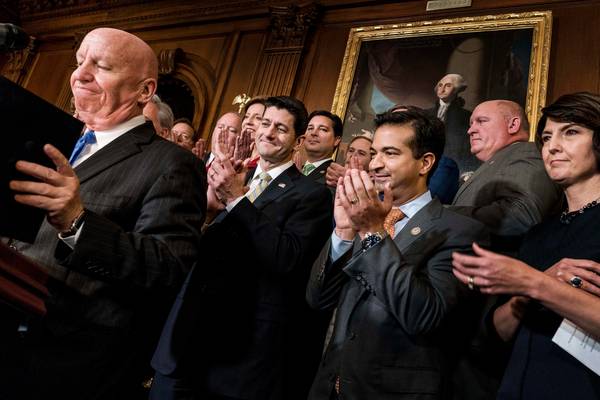Opinion
The House Just Voted to Bankrupt Graduate Students
Republicans in the House of Representatives have just passed a tax bill that would devastate graduate research in the United States. Hidden in the Tax Cuts and Jobs Act is a repeal of Section 117(d)(5) of the current tax code, a provision that is vital to all students who pursue master's degrees or doctorates and are not independently wealthy.
I'm a graduate student at M.I.T., where I study the neurological basis of mental health disorders. My peers and I work between 40 and 80 hours a week as classroom teachers and laboratory researchers, and in return, our universities provide us with a tuition waiver for school. For M.I.T. students, this waiver keeps us from having to pay a bill of about $50,000 every year — a staggering amount, but one that is similar to the fees at many other colleges and universities. No money from the tuition waivers actually ends up in our pockets, so under Section 117(d)(5), it isn't counted as taxable income.
But under the House's tax bill, our waivers will be taxed. This means that M.I.T. graduate students would be responsible for paying taxes on an $80,000 annual salary, when we actually earn $33,000 a year. That's an increase of our tax burden by at least $10,000 annually.
t would make meeting living expenses nearly impossible, barring all but the wealthiest students from pursuing a Ph.D. The students who will be hit hardest — many of whom will almost certainly have to leave academia entirely — are those from communities that are already underrepresented in higher education.
Some universities might be able to cover tuition for some students, but in so doing, they would be forced to decrease the total number of graduate students they accept. American applicants to graduate school will leave the United States in favor of less expensive international institutions, and United States institutions will be unable to attract international candidates. At M.I.T., 43 percent of graduate students are foreign nationals, many of whom receive international funding. These students conduct transformative research, and bring so much diversity of culture, experience and expertise to our schools. Do we really want to shut out the next generation of innovators from our universities?
Graduate students are part of the hidden work force that drives some of the most important scientific and sociological advancements in the country. The American public benefits from it. Every dollar of basic research funded by the National Institutes of Health, for example, leads to a $1.70 output from biotechnology industries. The N.I.H. reports that the average American life span has increased by 30 years, in part, because of a better understanding of human health. I'd say that's a pretty good return on investment for United States taxpayers.
I personally owe my life and mobility to academic research. In 2015, I found out I had reflex sympathetic dystrophy (also known as complex regional pain syndrome), and since then, I have spent around 20 percent of my annual income on medical expenses. If Congress passes the House Republicans' tax bill as it stands, I will be forced to choose between medical expenses and my education.
In a horrible twist, the repeal of Section 117 (d)(5) isn't the only part of the tax bill that would hurt college students. The House bill would also end the student loan interest deduction, which allows individuals who make up to $80,000 and are repaying student loans to decrease their debt. It also eliminates the Lifetime Learning Credit, which is instrumental for many nontraditional students.
And still, House Republicans voted this bill into law. Now it is up to our representatives in both the House and Senate to reject it.
Erin Rousseau is a Ph.D. Student in the Harvard-M.I.T. Program in Health Sciences and Technology.
****
Juan
Juan
Patriotism is not a short and frenzied outburst of emotion but the tranquil and steady dedication of a lifetime.
- Adlai Stevenson




No comments:
Post a Comment